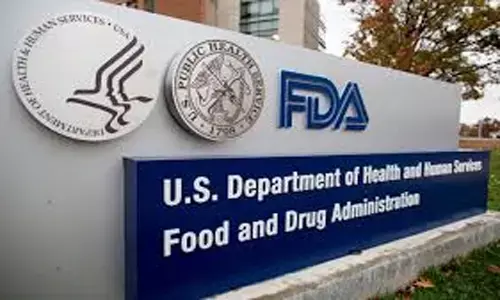- Home
- Medical news & Guidelines
- Anesthesiology
- Cardiology and CTVS
- Critical Care
- Dentistry
- Dermatology
- Diabetes and Endocrinology
- ENT
- Gastroenterology
- Medicine
- Nephrology
- Neurology
- Obstretics-Gynaecology
- Oncology
- Ophthalmology
- Orthopaedics
- Pediatrics-Neonatology
- Psychiatry
- Pulmonology
- Radiology
- Surgery
- Urology
- Laboratory Medicine
- Diet
- Nursing
- Paramedical
- Physiotherapy
- Health news
- Fact Check
- Bone Health Fact Check
- Brain Health Fact Check
- Cancer Related Fact Check
- Child Care Fact Check
- Dental and oral health fact check
- Diabetes and metabolic health fact check
- Diet and Nutrition Fact Check
- Eye and ENT Care Fact Check
- Fitness fact check
- Gut health fact check
- Heart health fact check
- Kidney health fact check
- Medical education fact check
- Men's health fact check
- Respiratory fact check
- Skin and hair care fact check
- Vaccine and Immunization fact check
- Women's health fact check
- AYUSH
- State News
- Andaman and Nicobar Islands
- Andhra Pradesh
- Arunachal Pradesh
- Assam
- Bihar
- Chandigarh
- Chattisgarh
- Dadra and Nagar Haveli
- Daman and Diu
- Delhi
- Goa
- Gujarat
- Haryana
- Himachal Pradesh
- Jammu & Kashmir
- Jharkhand
- Karnataka
- Kerala
- Ladakh
- Lakshadweep
- Madhya Pradesh
- Maharashtra
- Manipur
- Meghalaya
- Mizoram
- Nagaland
- Odisha
- Puducherry
- Punjab
- Rajasthan
- Sikkim
- Tamil Nadu
- Telangana
- Tripura
- Uttar Pradesh
- Uttrakhand
- West Bengal
- Medical Education
- Industry
FDA Approves Antibiotic for nosocomial and ventilatilator associated bacterial Pneumonia

The U S food and drug administration has approved antibiotic combination imipenem-cilastatin and relbactam (Recarbrio) for the treatment of hospital-acquired bacterial pneumonia and ventilator-associated bacterial pneumonia (HABP/VABP) in patients aged 18 years and older.
Recarbrio was previously FDA-approved to treat patients with complicated urinary tract infections and complicated intra-abdominal infections who have limited or no alternative treatment options.
"As a public health agency, the FDA addresses the threat of antimicrobial-resistant infections by facilitating the development of safe and effective new treatments," said Sumathi Nambiar, M.D., M.P.H., director of the Division of Anti-Infectives within the Office of Infectious Disease in FDA's Center for Drug Evaluation and Research. "These efforts provide more options to fight serious bacterial infections and get new, safe and effective therapies to patients as soon as possible."
HABP and VABP are a type of pneumonia that occurs in hospitalized patients and can cause symptoms such as fever, chills, cough, chest pain and increased oxygen requirements. Recarbrio is a combination of imipenem-cilastatin and relebactam. The drug is administered intravenously by a health care professional.
The safety and efficacy of Recarbrio for the treatment of HABP/VABP were evaluated in a randomized, controlled clinical trial of 535 hospitalized adults with HABP/VABP due gram-negative bacteria (a type of bacteria) in which 266 patients were treated with Recarbrio and 269 patients were treated with piperacillin-tazobactam, another antibacterial drug. Overall, 16% of patients who received Recarbrio and 21% of patients who received piperacillin-tazobactam died through Day 28 of the study.
The most common adverse reactions observed in patients treated with Recarbrio for HABP/VABP included increased aspartate/alanine aminotransferases (increased liver enzymes), anemia, diarrhea, hypokalemia (low potassium) and hyponatremia (low sodium). Before initiating therapy with Recarbrio, careful inquiry should be made concerning previous hypersensitivity reactions to carbapenems, penicillins, cephalosporins, other beta lactams and other allergens. Recarbrio should not be used in patients who are prone to seizures and other central nervous system disorders. Clostridioides difficile-associated diarrhea has been reported with use of nearly all antibacterial agents, including Recarbrio, and may range in severity from mild diarrhea to fatal colitis.
This application was granted a Qualified Infectious Disease Program (QIDP) designation. This designation is given to antibacterial and antifungal drug products intended to treat serious or life-threatening infections under the Generating Antibiotic Incentives Now (GAIN) title of the FDA Safety and Innovation Act. Additionally, as part of QIDP designation, the FDA granted this application Fast Track and Priority Review designations.
The FDA, an agency within the U.S. Department of Health and Human Services, protects the public health by assuring the safety, effectiveness, and security of human and veterinary drugs, vaccines and other biological products for human use, and medical devices. The agency also is responsible for the safety and security of our nation's food supply, cosmetics, dietary supplements, products that give off electronic radiation, and for regulating tobacco products.
For further reference log on to:
FDA
Hina Zahid Joined Medical Dialogue in 2017 with a passion to work as a Reporter. She coordinates with various national and international journals and association and covers all the stories related to Medical guidelines, Medical Journals, rare medical surgeries as well as all the updates in the medical field. Email: editorial@medicaldialogues.in. Contact no. 011-43720751
Dr Kamal Kant Kohli-MBBS, DTCD- a chest specialist with more than 30 years of practice and a flair for writing clinical articles, Dr Kamal Kant Kohli joined Medical Dialogues as a Chief Editor of Medical News. Besides writing articles, as an editor, he proofreads and verifies all the medical content published on Medical Dialogues including those coming from journals, studies,medical conferences,guidelines etc. Email: drkohli@medicaldialogues.in. Contact no. 011-43720751


